Posts Tagged ‘Esber Yagmurdereli’
PEN Journey 26: Macedonia—Old and New Millennium
PEN International celebrates its Centenary in 2021. I’ve been active in PEN for more than 30 years in various positions and now as an International Vice President Emeritus. With memories stirring and file drawers of documents and correspondence bulging, I am a bit of a walking archive and have been asked by PEN International to write down memories. I hope this personal PEN journey will be of interest.
I remember diving from a rowboat into Lake Ohrid and swimming in pristine water. I love to swim but never did so at PEN Congresses. However, the 68th Congress was held on one of Europe’s oldest—3 million years old—and deepest lakes which floated in the mountainous region between North Macedonia and eastern Albania. The water was the cleanest I had ever seen or felt. I swam without looking back until finally, I heard a voice from the boat shouting, “Come back! You’re almost in Albania!”

Moments before Isobel Harry (l) (Canadian PEN) and Joanne Leedom-Ackerman (r) (American PEN) dive into Lake Ohrid for a swim between meetings at the 68th PEN Congress in Ohrid, Macedonia in 2002
Albania, or rather the Albanian Liberation Army, a paramilitary organization, had recently been in conflict in Macedonia and was the reason PEN’s Congress there had been postponed the year before. (PEN Journey 25)
Swimming with me was my friend Isobel Harry, Executive Director of Canadian PEN, and in the boat sat Cecilia Balcazar from Colombian PEN and another PEN member. They watched over us in this break from the PEN meetings. My memories of the 2002 PEN Macedonia Congress include intense meetings of the Assembly in the Congress Hall of the old Soviet-style Metropol Hotel and neighboring Bellevue Hotel conference center and relaxed gatherings afterwards at lakeside cafes in the town of Ohrid, a UNESCO World Heritage site.
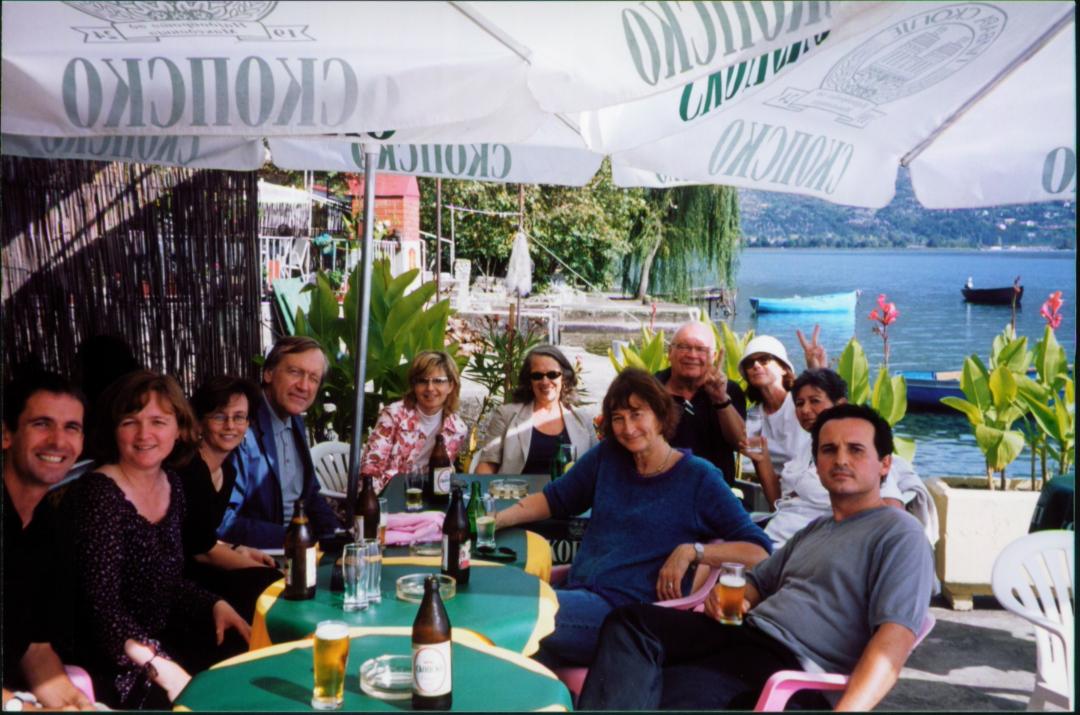
PEN colleagues at a lakeside cafe during the PEN Congress in Ohrid, Macedonia. (L to R) Dixie Willis and Sara Whyatt (WiPC staff), Susie Nicklin (English PEN), Eugene Schoulgin (Norweigan PEN & WiPC Chair), PEN member, Joanne Leedom-Ackerman (Vice President & American PEN), Niels Barfoed (Danish PEN), Isobel Harry (Canadian PEN), Fawzia Assaad (Swiss Romand PEN), Victoria Glendinning (English PEN), Carles Torner (PEN Board & Catalan PEN)
In the evenings we gathered for literary events with UNESCO-like titles—The Future of Language/Language of the Future and Borders of Freedom/Freedom of Borders. These were also the themes of the Congress. There was music and poetry in Macedonian and other languages I didn’t understand, recited in cavernous, shadowy chambers, including in the ancient Cathedral Church of St. Sophia, a structure from medieval times, rebuilt in the 10th century. Its frescoes still adorned the walls from Byzantine times in the 11th, 12th and 13th centuries and had been restored after the church was converted to a mosque during the Ottoman Empire.
While current politics and conflicts occupied the daytime work of PEN, history suffused the gathering. Civilization in Ohrid dated to 353 BC when the town had been known as “the city of light.”

Cathedral Church of St. Sophia in Ohrid
“The old millennium, especially in ‘old’ Europe, should, I believe, be left behind with all its anachronistic boundaries—geographical, historical, racial, ethnic, state, linguistic, religious and cultural—and give way to the unfolding of the new millennium, to its open-mindedness and tolerance,” Dimitar Baševski, President of Macedonian PEN, wrote in his introduction to the Congress. “For generations we in Macedonia have lived with a creed according to which culture and not warfare or power is perceived as the field for competitiveness among nations. The aims of the World Congress of International P.E.N. in 2002 perfectly correspond with the spirit of this creed.”
Over 300 people from 69 PEN Centers gathered in the hills of this North Macedonian city for the 68th World Congress. The Congress’ work included the activities and reports of PEN’s committees—Writers in Prison, Peace, Translation and Linguistic Rights, Women’s, Exile Network—and the PEN Foundation, PEN International Magazine, and PEN Emergency Fund. There was a proposed revision to PEN’s Charter removing the concept of literature as being national in origin; there was the introduction of new centers, the dissolution of inactive centers and the elections for the Board, Vice Presidents, and Search Committee. There was a report from the International Secretary on the renewal of PEN’s “formal consultative relations” with UNESCO for a further six years, a step that acknowledged PEN as the only voluntary organization and the only literary organization in this category and one of only 12 organizations with a “Framework Agreement.” PEN had also been reclassified as a Category II organization with ECOSOC (United Nations Economic and Social Council) which included organizations with “special competence in specific areas” such as Amnesty and Human Rights Watch, a category that reflected PEN’s status and contribution as the only world writers organization within the UN system. At PEN’s Assembly of Delegates attention was called to a dozen PEN conferences—last year’s and the year ahead—and finally the Assembly passed Resolutions from the Writers in Prison Committee and Peace Committee on the situations in Russia and Chechnya, Russia itself, the Middle East, Belorussia, China, Colombia, Cuba, Iran, Turkey, Zimbabwe, Uighur Writers, and Tatarstan
The aftermath of the 9/11 attacks on the United States the year before remained a focus that was altering the security landscape for nations around the world and for writers. PEN President Homero Aridjis observed, “Today our world is teetering on the brink of war.” He added, “In search of security, there have been encroachments on privacy and intrusive measures threatening freedom of expression and the right to dissent and criticize, but the global reach of information seems to have accelerated, proof of which is the current effort by the Chinese government to block its citizens’ access to the search-engine Google.”
“How can PEN and writers bring about positive changes?” he asked. “For a start, we could promote freedom of expression in Afghanistan. Not that long ago we were signing Internet petitions protesting against the treatment of women by the inhumane Taliban regime and begging the Taliban not to dynamite the colossal Buddhas of Bamiyan. Now I ask you to help me identify and approach Afghani writers who would be willing to found a PEN Center in Afghanistan and to try and find ways of giving this fledgling Center the means to thrive.”
[With the help of Norwegian PEN and others, an Afghan PEN Center was in fact founded with men and women writers from all ethnic groups and was voted into PEN at the 69th Congress the following year in Mexico. Writers in Prison Committee Chair Eugene Schoulgin played an instrumental role in working with and facilitating support for the Afghan writers.]
At the Macedonia Congress Eugene reported, “In my speech in London last November I mentioned the threats to the freedom of expression I feared that would follow the events of 9/11 in the US. What has happened last year has unfortunately proved these fears were well founded. Today over 40 countries have imposed new legislation on their populations which clearly weaken their human rights. New Anti-terror laws have been established in Canada, USA, UK, France, EU as a whole, Jordan, India and New Zealand. Terrorism laws expanded on Cuba and on Italy and in Colombia, Egypt, Zimbabwe, Israel, Russia, Uzbekistan, China and in the Philippines, and terror laws have been used as an excuse to crack down on the opposition and on minorities inside their regions. This in combination with the threats of a new war on Iraq makes the present situation extremely worrying, and will most certainly give us in the WiPC reason to be even more vigilant in the year to come.”
Visiting the WiPC Committee at the Congress were two former PEN main cases—Eşber Yağmurdereli, Turkish poet/dramatist and lawyer, who was blind and spent 14 years in prison and whom a number of us had met in Istanbul at a Freedom of Expression Initiative a few years before and Flora Brovina, a Kosovair/Albanian poet and doctor who had been abducted by Serbian troops and imprisoned in Belgrade during the NATO bombing. Flora’s son had contacted PEN which sent out an urgent appeal about her abduction. I had met her husband and family when I visited Pristina, Kosovo the year before with the International Crisis Group while she was still in prison. This was the first time I met Flora, who had become an internationally celebrated case and was a member the country’s Assembly. She told the Writers in Prison Committee that every letter sent to the prison by PEN served as another attempt to tear down the walls of the prison.
Esber Yagmurdereli said at present there were around 10,000 prisoners accused of being “terrorists,” but 90% of these should be considered prisoners of conscience, and many were simply students. “On 19 December 2000, the 20th day of the protest, I was playing chess with my friend in my cell,” he said. “He was a university student named Irfan. He was my son’s age–21 or 23 years old. He defeated me three tims. He said you are 60 years old. There are so many of us whose cases ar not covered in the press, but you do get attention. We need you as much as you need us. Then came the teargas. The protests took three yours. I myself lost consciousness and came to about an hour later. I learned that 32 people had been killed–burned to death. I learned that my friend Irfan was one of them.”
Russian journalist Anna Politkovskya also attended the Macedonian Congress. She told the WIPC meeting that she got threats from criminals, military and government. “I could stay in Vienna or elsewhere in the West, but it is my decision to be in Russia because I understand more than other people that if I couldn’t write articles or give radio talks, there would be no information about Chechnya,” she said. “Because travel to Chechnya is illegal, I need to prepare my trips as if I were a spy. I have to be strong, as far as I can. My children are in Moscow, and they are also threatened. ” My last meeting with Anna was sharing thick coffee at a tiny airport café in Skopje on our way home from the Congress.
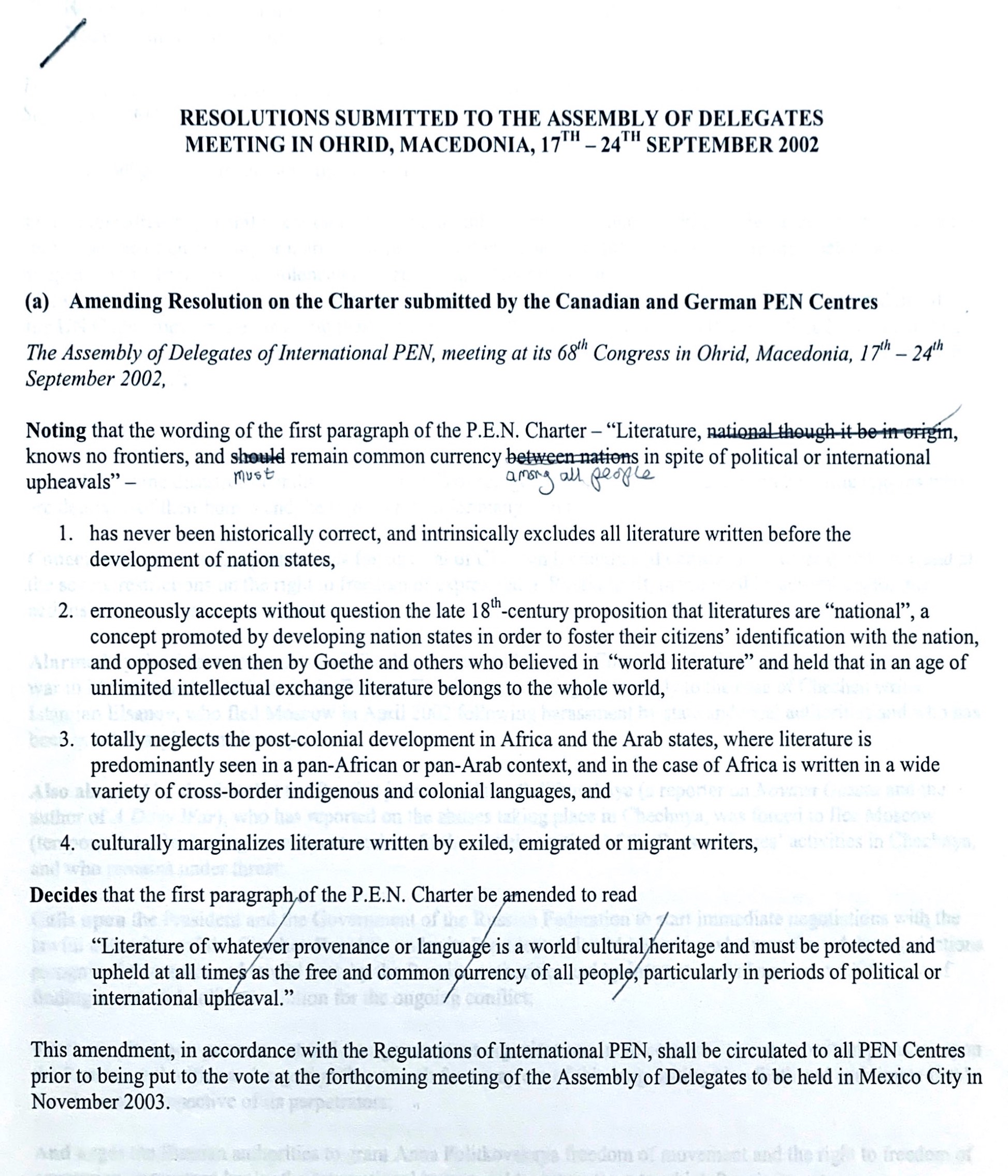
Resolution for change in wording of PEN’s Charter; amended wording, noted and approved, proposed by English PEN president Victoria Glendinning. Final proposal and approval to take place at Mexico Congress in 2003.
In addition to its traditional work, International PEN was proceeding with modernizing its governance and structure, led by International Secretary Terry Carlbom and the Board of PEN. Deputy Vice Chair of the Board Carles Torner reported that this included the restructuring of PEN and the PEN Foundation as British charitable tax law was changing; also new roles for the Vice Presidents were being considered; a modest change in the Charter was proposed for this Assembly to be confirmed at the next year’s Congress in Mexico, and the Treasurer was proposing a new international dues structure with a graded system, raising dues for centers from wealthier economies and reducing dues for others, based on the World Bank system of four categories. The change in the dues structure was unanimously approved.
Elections at the Congress included two new Vice Presidents Lucina Kathmann (San Miguel Allende PEN) and Boris Novak (Slovene PEN) and new Board members Takeaki Hori (Japan PEN), Cecilia Balcazar (Colombian PEN), Sibila Petlevski (Croatian PEN) and Elisabeth Nordgren (Finnish PEN).
“We are at the end of the first mandate of the first Board elected three years ago during the Warsaw Congress under the new Regulations.” Carles reported. “…we now have a real capacity for collective decision-making between Congresses…we are noticing that the transformation we dreamed of six years ago, when the new structuring of International PEN started, has taken place. There are more people involved in the work of International PEN, and each person represents a specific sensitivity within our international community…and we are better prepared to achieve our task now and in the future.”
The modernization and reform of governance also applied to PEN’s more than 130 centers with agreement that new centers from unrepresented parts of the world needed to be developed and centers that no longer functioned or worked in harmony with PEN’s Charter should be disbanded though there was often reluctance among PEN members to close a center.
At the Macedonia Congress, a particular PEN-like debate arose over the Langue d’Oc Center which no longer functioned. Langue d’Oc, or the Language of the Troubadours, was still spoken in a region in the South of France, in part of Italy and in one valley in Spain. The center’s president, whose name was the same as a great literary character, had worked on PEN’s Universal Declaration of Linguistic Rights with PEN’s Committee on Translation and Linguistic Rights half a dozen years before, and one member was still eager to keep the center going as a cause of minority languages. But the elderly outgoing President was not able to help, according to Jane Spender, PEN’s Administrative Director, who communicated or tried to communicate, with these centers. The center no longer functioned, had no office or contacts who replied, she reported. Before the center was declared closed, however, former International Secretary Alexander Blokh proposed that it be declared dormant and during the ensuing year French PEN writers who knew some of the members would “try to wake them up.” The Portuguese PEN delegate also offered to help as did the Esperanto, Slovene and Galician delegates. A similar lifeline was given to the inactive Welsh center by English PEN who agreed to perform the same role.
At PEN’s Congress the following year in Mexico, the interventions confirmed that after a year of dormancy neither center had rallied and so the Assembly voted to close the centers. In both cases new writers then came forward, and a few years later a new and active Welsh Center and Langue d’Oc Center formed and were elected back into PEN’s Assembly.
At the Macedonia Congress three brand new centers—Kyrghyz, Sierra Leone, and Tibet—joined the PEN family. It was in this fashion that PEN International pruned, renewed and broadened its base in civil society among nations and cultures and languages.
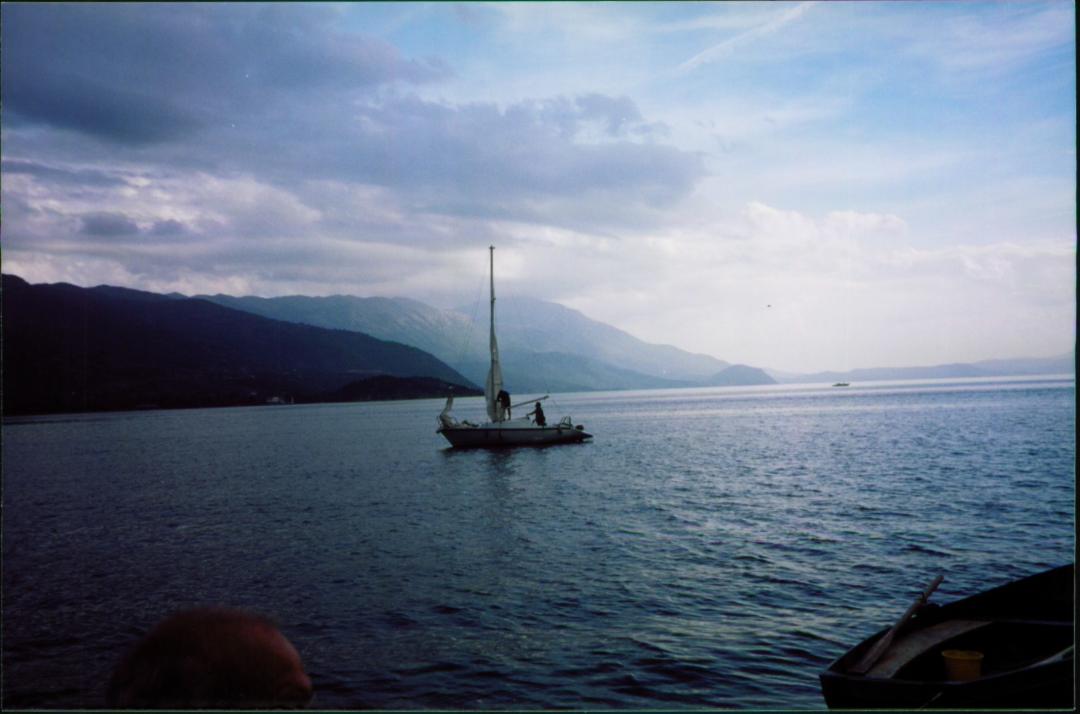
Lake Ohrid in the hills of North Macedonia between Macedonia and eastern Albania
Next Installment: PEN Journey 27: San Miguel Allende and Other Destinations–PEN’s Work Between Congresses
PEN Journey 19: Prison, Police and Courts in Turkey: Initiative For Freedom of Expression
PEN International celebrates its Centenary in 2021. I’ve been active in PEN for more than 30 years in various positions and now as an International Vice President Emeritus. With memories stirring and file drawers of documents and correspondence bulging, I am a bit of a walking archive and have been asked by PEN International to write down memories. I hope this personal PEN journey will be of interest.
We sat on the ferry drinking strong Turkish coffee then handing over the emptied cups to a woman who read fortunes from the pattern of the leftover coffee grounds. As we huddled in the wind off the Sea of Marmara en route to the prison in Bursa, we speculated who among the passengers was following us. We were assured we were being followed.

Program for Initiative for Freedom of Expression Gathering, March 1997
I came to Turkey in March 1997 as the returning Chair of PEN International’s Writers in Prison Committee (WIPC) (PEN Journey 18). I was heading a delegation of 20 PEN members from 12 countries. We’d arrived to support Turkish PEN, the Turkish Writers’ Syndicate, the Literary Writers Association and the Initiative for Freedom of Expression in the first Gathering in Istanbul for Freedom of Expression. We had signed on as “publishers” to an abridged version of the book Freedom of Expression. The original book included essays by those who were in prison or facing charges for their writing, particularly former president of Turkish PEN, the prominent novelist Yaşar Kemal. He was tried for an article he’d published in the German magazine Der Spiegel. (PEN Journey 17). Headlined “Campaign of lies,” the article called out the government for its human rights abuses, particularly its treatment of the Kurds.
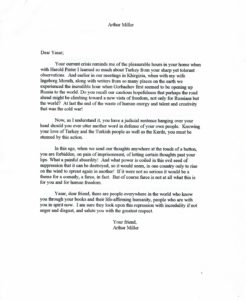
Arthur Miller letter to Yaşar Kemal, March 1997
Bearing a letter from Arthur Miller, who knew Kemal and had himself come to Turkey with Harold Pinter in solidarity a dozen years before, I was among the 141 “foreign publishers” of the booklet Mini Freedom of Expression. This book contained a paragraph from each article published in the larger book. We joined the 1080 Turkish “editors” of the larger volume who included writers, theater actors, politicians, painters, cinema actors and directors, cartoonists, musicians, trade unionists, academics, lawyers, architects and others. The Turkish Penal Code made it a crime to re-publish an article that had been defined as a “crime” so that the publisher as well as the writer was charged.
The “publishers” had presented themselves before the State Security Court and faced charges of “seditious criminal activity.” After questioning the first 99 people, the prosecutor demanded the accused be tried under Article 8 of the Anti-Terror Law and Article 312 on “disseminating separatist propaganda.” After six months only 185 of these individuals had been questioned and brought to trial. If these individuals were given the usual 20-month jail sentence, that would mean ten popular television programs would have to be canceled because their stars or directors would be in prison; five series would have to find new stars and change their story lines. The media would lose over 30 well-known journalists; 15 popular columns would be left blank. Eight professorial chairs would be left vacant, and universities would require new teaching staff. Theater stages and film sets would require many other artists, directors, musicians, etc., and 20 new books about prison life would be added to literature if every author wrote.
Turkey already had over 200 writers either in prison or entangled in legal processes, more than any other country. This protest initiative was unique and creative. The challenge to the court was to bring charges against so many. The State Prosecutor had dropped charges against the foreign participants on the grounds that he wasn’t able to bring us to Istanbul for questioning though the Turkish citizens who had prepared and distributed the booklet could be tried. The organizer of the initiative Şanar Yurdatapan suggested we come to Istanbul and challenge the prosecutor. Though PEN members were willing to come to support their Turkish colleagues, no one wanted to end up in a Turkish prison.
“No one will go to prison,” Şanar assured. The prosecutor had to act within six months, and even in the unlikely event charges were brought, we’d go home before a trial, and there was no extradition from the US, UK and many other countries because no such “offense” existed under their laws. Unlike organizations such as Greenpeace, PEN was not a direct action organization. PEN dealt in words, protest letters, diplomacy, meetings, on occasion candlelight vigils outside embassies and stories in the media. But Şanar, who was a song writer, civic activist, not a PEN member, instinctively understood the dynamics of nonviolent direct action and understood how to get attention and make the point that the Turkish laws were unjust and unfairly administered.
On our first day, which was Women’s Day, we joined the Saturday Mothers’ rally of relatives of the disappeared who gathered every Saturday seeking information on their family members. The gathering had been held every Saturday for a year and a half at Galatasaray Square, ten minutes from our small hotel in Taksim. The crowd of mothers and children held pictures and signs of their loved ones, mostly Kurds, who had been taken away, assumedly by the government and likely killed. On the edges of the crowd police in riot gear gathered but didn’t interfere. Meeting at Galatasaray Square is now banned for Saturday Mothers by the Ministry of Interior since August 25, 2018. They still keep the rally at Human Rights Association branch in one of the back streets.
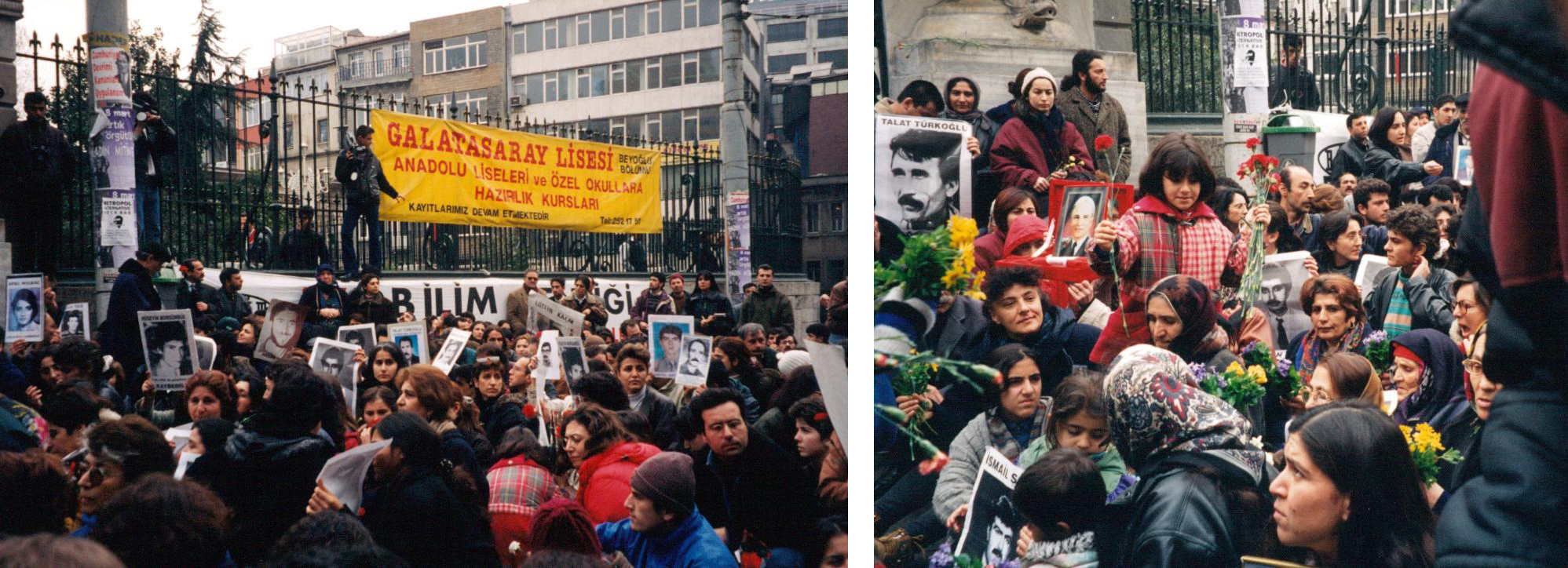
Saturday Mother’s Rally of relatives of the disappeared who gathered every Saturday seeking information on their family members.
From there a number of us went to a women’s rally where hundreds of Kurdish women in traditional dress marched with banners shouting, “We are mothers; we are for peace! Mafia is in Parliament; students are in prison.” Along the route men cheered and dozens of police lined the road frisking and checking bags. This was the last weekend of a 40-day protest all over Turkey. At 9pm every night people around the country turned out their lights or blinked their lights and shouted out their windows and in the street, “Go Away!” in protest over the government. The idea was that people would have one minute of darkness to get years of light. At dinner that Saturday evening we watched as the streets filled with shouting and the lights in restaurant blinked on and off.

Women’s Day march of Kurdish women with police positioned along the route.
The trip to Istanbul was my first of what would turn out to be dozens of visits to Turkey over the years for PEN, for other organizations, and for family. In 1997 the times were tense; soldiers with their weapons and machine guns were stationed at the airport; armed police were on the streets; we were followed; the phones at the hotel were likely tapped. It was difficult to imagine then that it would get much better in the following decade as it did and then much worse in recent years. I’m not sure today we could hold such a gathering with confidence.
Throughout our visit we were covered by the press, including two visits to the State Security Court. In 1997 the legal way to meet publicly was to hold a press conference so we spent our days in press conferences, including one at the Journalists Association. Because I was Chair of the WiPC, I was often the one explaining why we were there. I emphasized that we had come out of respect for Turkish literature and writers. We had not come to break Turkish laws; we did not consider editing a book a crime. We were there to uphold the international covenants that Turkey had signed, approved and became a party to: the Universal Declaration of Human Rights (Article 19), Article 19 of the UN Convention on Civil and Political Rights and Article 90 in the European Convention on Human Rights. We noted that Article 90 in Turkey’s own Constitution declared that no law should supersede these international covenants.
Our PEN delegation included representatives from Canada (Quebec), Finland, Germany, Holland, Israel, Mexico, Palestine, Russia, Sweden, United Kingdom, United States and Turkey. The delegates included James Kelman, Booker Prize winner from Scotland and Turkish writers including Yaşar Kemal, Orhan Pamuk and others.

PEN members from 12 countries join Turkish colleagues for dinner at the first Gathering of the Initiative for Freedom of Expression in Istanbul, March 1997
On Monday we started the day at the State Security Court where Şanar petitioned the prosecutor for an appointment to question one delegate who had to leave early. Because the prosecutor didn’t want to bring charges against “international editors”, an act that would bring international attention, the “Turkish editors” could use this failure as further evidence of the unfair nature and application of the law when they took the case to the World Court. We approached the State Security Court again on Wednesday, when the prosecutor actually locked the gates and wouldn’t see any representative of our group. In the end nine of us—from USA, England, Scotland, Finland, Holland, Sweden, Canada (Quebec), Mexico and Russia—signed a form which said, “I accepted to be one of the collective publishers of this book willingly and I am aware of the legal responsibility. I have nothing else to say.” These forms were then sent registered mail to the prosecutor.
Two small groups visited prisons and the prisoners of conscience, including Dr. İsmail Beşikçi and his publisher Ünsal Öztürk in Bursa and journalist Işık Yurtçu in Adapazarı prison. Louise Gareau-Des Bois from Quebec PEN went to the Adapazari prison and was able to visit with Işık Yurtçu.
Kalevi Haikara from Finland and I went with Şanar on the ferry to the prison in Bursa where we met Ünsal Öztürk’s wife Süreyya. We waited and waited and talked together in the bleak courtyard with grey concrete walls rising around us topped with barbed wire, with guard towers looming over us. We went to the pink concrete building of Bursa Prison with a shield on the door “Ministry of Justice Bursa Special Prison” and waited there too. But we were not allowed to see İsmail Beşikçi, the noted Turkish sociologist and philosopher who wrote about the Kurds history and living conditions. He was one of the few non-Kurdish writers in Turkey speaking out about the treatment of the Kurds. At the time he was also one of the longest serving prisoners. He’d been sentenced to over 100 years though he was released from jail two years after our visit. Of his 36 books, 32 were banned in Turkey.

Kalevi Haikara from Finish PEN and Joanne Leedom-Ackerman, WiPC Chair and member American PEN outside prison in Bursa, along with Süreyya, wife of prisoner Ünsal Öztürk (middle picture) and in conversation at Bursa Prison (far right picture.)
We were also not allowed to see Ünsal Öztürk, Beşikçi’s publisher, who had completed more than a three-year sentence. We met with the press which had gathered. We paid the outstanding fine against Öztürk with funds raised from Turkish writers, artists and many of the visiting PEN members. Öztürk was released the following day though there remained 30 outstanding cases against him, 62 charges waiting to be brought to court, all relating to Beşikçi. Every time he published a book, a charge was brought, but he kept publishing. Öztürk and his wife joined the conference.
The following day we attended the Justice House hearing of the “Kafka Trial.” When one editor of the Freedom of Expression book—actor Mahir Günşiray—faced the judges, he’d read a paragraph from Kafka’s The Trial. The paragraph offended the judges, and they brought a civil suit against him. Sixty-five other writers and artists signed on and said they also endorsed the reading of Kafka and should thus be guilty too. We all piled into the small room where the defendant Mahir Günşiray and his lawyer and the judge met. The hearing was the second or third for him, but with the room full of observers, the judge again postponed the proceedings.
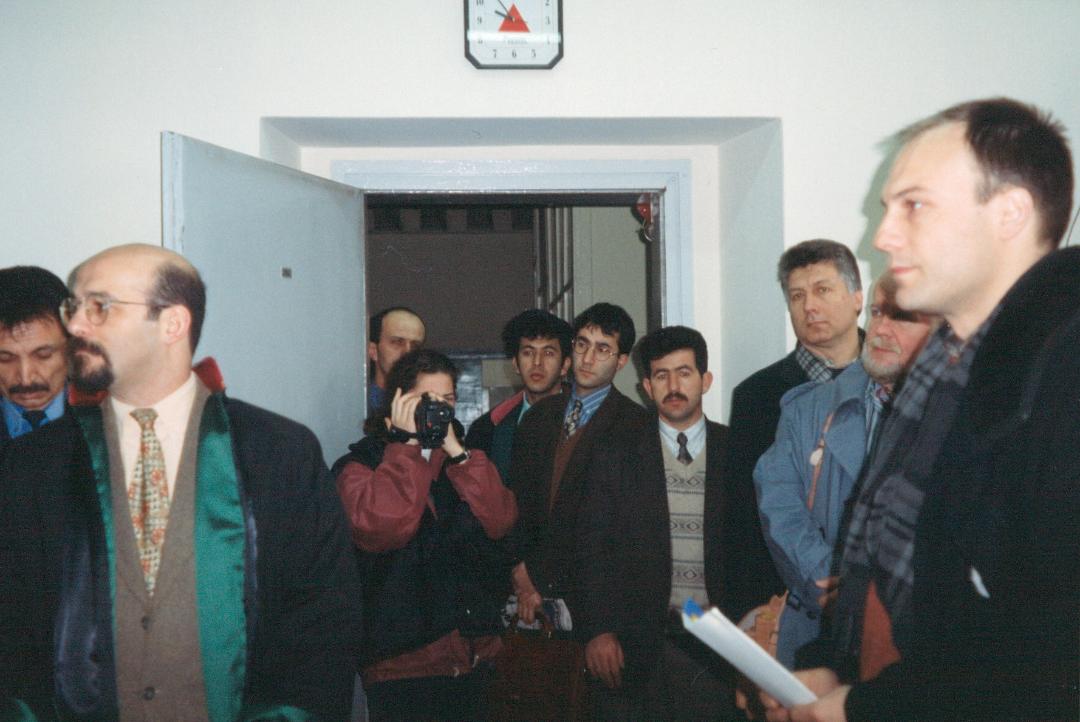
At hearing of “Kafka Trial” in the Justice House
Many of us went next to Istanbul University to participate in a Forum on Freedom of Expression. However when we arrived, hundreds of students were protesting in the plaza, surrounded by riot police with shields. The situation was tense. In Ankara students had recently been arrested after they’d unfurled a banner in Parliament challenging the 300% tuition increase at state universities. The student protesters there were tried with the demand of 18-year prison sentences. The students at Istanbul University asked if we would speak at the rally. None of us were prepared for this potentially explosive scene. The writers who’d come to speak on freedom of expression asked me to talk for the group, all except Sascha from Russian PEN who also wanted to speak. Sascha, Şanar and I addressed the crowd. I emphasized that we were there to uphold the right for free expression, not to take a side with any particular party of government or to take sides on how education was financed in Turkey, but to insist that individuals should have the right to discuss, debate and write about these issues without facing prison terms. We urged that the protest stay nonviolent. We were then ushered out through the police corridor.

Rally at Istanbul University (Includes Soledad Santiago (San Miguel Allende PEN), James Kelman (Scottish PEN), Alexander (Sascha) Tkachenko (Russian PEN), Kalevi Haikara (Finish PEN), Joanne Leedom-Ackerman, (WiPC Chair/American PEN), Hanan Awwad (Palestinian PEN), Turkish writer Vedat Türkali, and Şanar Yurdatapan (with bullhorn).
In the evening the Istanbul Bar Association hosted us. The head of the Bar noted that the Turkish Constitution protects the state against the individual rather than the other way around as in the US. Everyone agreed there was free expression in many quarters of Turkey, but that the danger arose when one addressed Kurdish issues and Kurdish separatism and referred to the PKK.
Attending the meeting was the former PEN main case Eşber Yağmurdereli, a blind poet/dramatist, who’d served 14 years in prison. Released August 1991, he’d spoken in September 1991 at a meeting on behalf of Kurdish prisoners and had new charges brought against him. After five years he was still awaiting the resolution of that case. His passport had been taken from him. He could be sent back to prison for more than 20 years. He said he was unable to write, and if he wrote, he had to hide the writing and not publish. He earned his living now as a lawyer.
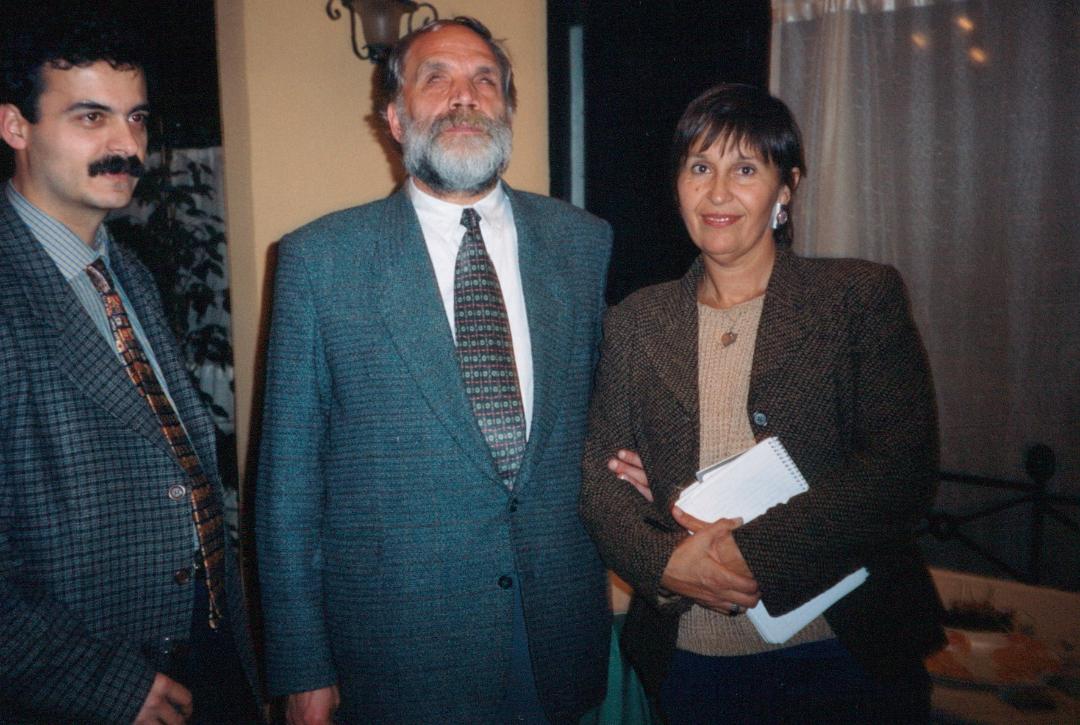
Meeting with Istanbul Bar Association. Eşber Yağmurdereli (middle) and Soledad Santiago (San Miguel Allende PEN) on right.
I also met the young brother of Bülent Balta, an investigation case. Balta, a chemistry honors graduate, a Turk, not a Kurd, had agreed to edit Özgür Gündem, the Kurdish newspaper, because of his sympathies for the difficulty of the Kurds. He had no particular experience as an editor, and after only 11 days was arrested and was serving a four-year prison sentence.
That evening the protest at Istanbul University was all over the news, including pictures of me with a bull horn speaking, but my words had been translated into Turkish so I had no clear idea what it was reported I was saying.
Early the next morning I slipped out of our hotel and walked to a large international hotel nearby where I called home. I asked my husband to confirm my return flight the following day. He asked what the flight was, but I told him to check with the travel agent and confirm. Over the phone I didn’t want to give flight details. I told him what was happening, including the widespread coverage of the protest with my participation, and he told me a colleague in Washington said that the American Embassy knew I was there and warned me not to leave the hotel. I had to leave the hotel, I explained. I was leading the delegation and events were planned, including a farewell dinner on the Bosphorus.
At the final panel/press conference, I noted that I had two sons, and as I observed the young people here, especially the young police officers and the young students, I felt sorrow that these youth were set across battle lines from each other. There was so much talent and promise we had seen. For the first time in the three days of speeches and press conferences, emotion stirred in my voice and I paused for a moment. One of the headlines the following day read something to the effect: “She Cries for Turkey!”

Panel at Initiative for Freedom of Expression Conference, Istanbul March, 1997
The following morning I was to be driven to the airport, but the driver didn’t show up, and I was left to find my own transportation in a taxi. The atmosphere around the conference had slowly made each of us cautious, even slightly paranoid. As I climbed into the taxi, driven by a stranger, I remembered the fortune teller on the ferry a few days before. Proceed with caution…was that her warning? You will make friends…was that the prediction? The road ahead is fortuitous but also fraught? In fact, I no longer remembered what her fortunes were, and I didn’t believe in fortunes or scattered coffee grounds, but I left Istanbul with a strong belief in the people and a commitment to the country and to the writers and publishers and lawyers and journalists and to the young people I had met and to the promise they represented.
In years following I returned to Turkey on numerous missions for PEN and for meetings with Human Rights Watch, with the International Crisis Group, on a trip with UNHCR looking at the Syrian refugee crisis, and several trips with my oldest son who wrestled in the World Championships and European Championships in Ankara and in the World Championships again in Istanbul and also lectured in mathematics at Koc University and other universities and with my youngest son who lived in Istanbul for two years with his two young children and wrote as a journalist on the Turkish/Syrian border and has set two of his four published novels in Turkey.
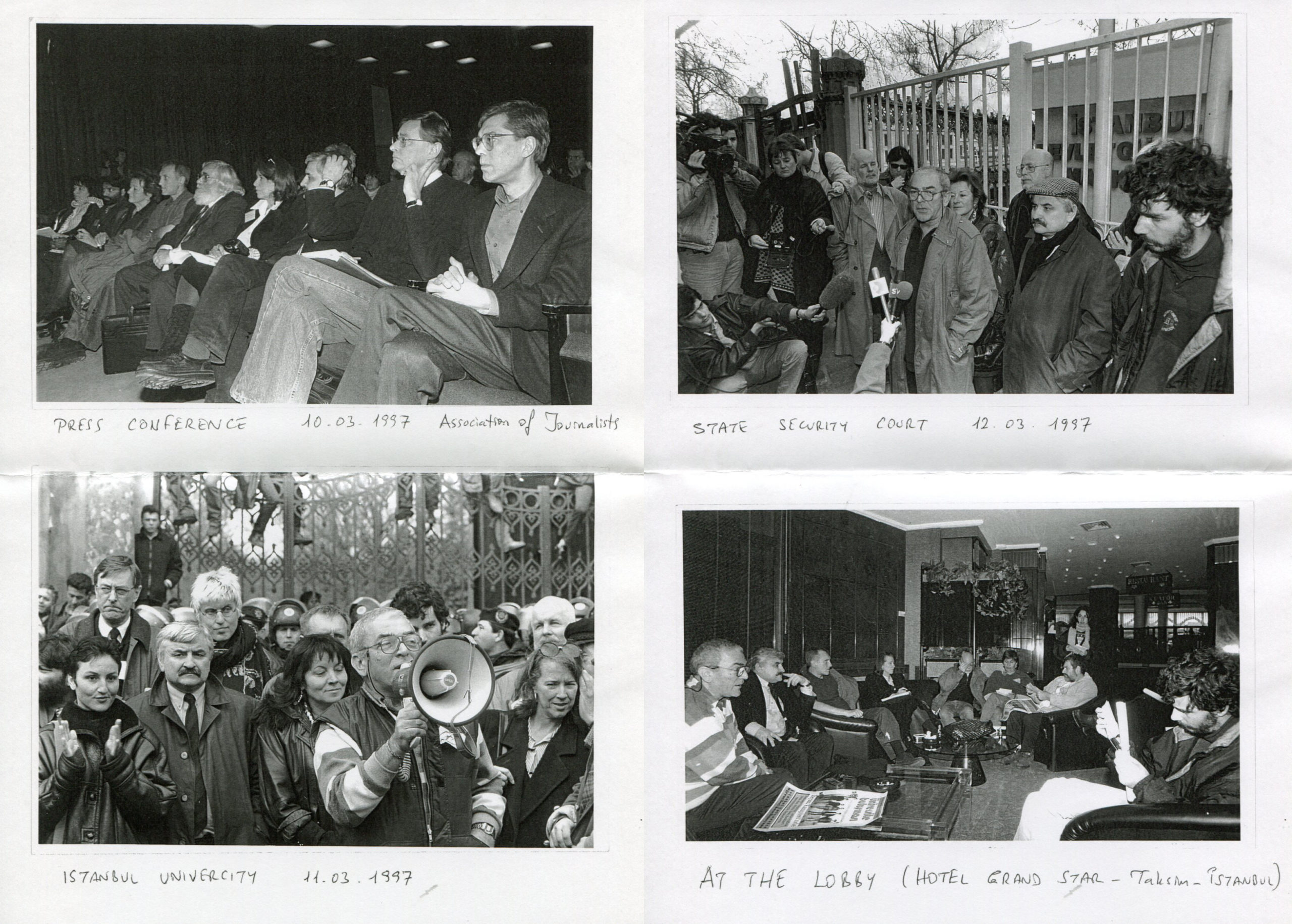
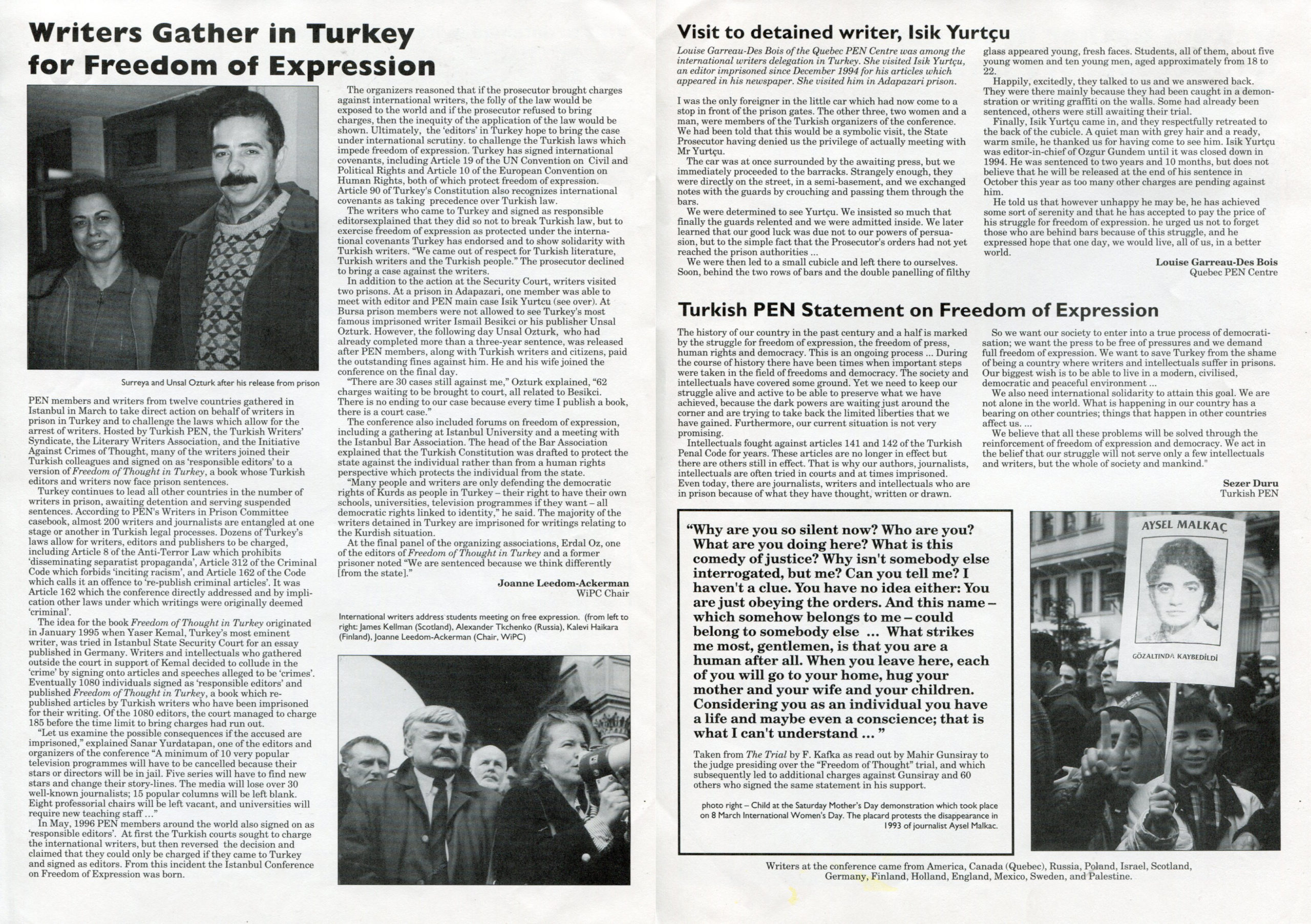
PEN International Writers in Prison Committee Centre to Centre newsletter special Turkey section April 1997
Next Installment: PEN Journey 20: Edinburgh—PEN on the Move, Changes Ahead
PEN Journey 16: The Universal, the Relative and the Changing PEN
PEN International celebrates its Centenary in 2021. I’ve been active in PEN for more than 30 years in various positions and now as an International Vice President Emeritus. With memories stirring and file drawers of documents and correspondence bulging, I am a bit of a walking archive and have been asked by PEN International to write down memories. I hope this personal PEN journey will be of interest.
Fremantle, Australia is far away, at least if you live in the Americas or Europe or West Africa. So is Tokyo, Manila, Nepal, Hong Kong,—all destinations of PEN Congresses and conferences. As a global organization with centers in over 100 countries, PEN tries to cover the world with its meetings and at least once or twice a decade organize a Congress in Asia or Australia with its centers there.
 In 1995 for PEN International’s 62nd Congress Perth PEN hosted delegates from around the world in Fremantle, a port city on Australia’s western coast in the Perth metropolitan area, a picturesque city with Victorian architecture and, as I recall at the time, a town out of the 1960’s where time hadn’t quite caught up. The city’s reputation was partially derived from its history as a penal colony from the 1850’s to 1991. The traditional Aboriginal people who lived there called the area Walyalup “the crying place.”
In 1995 for PEN International’s 62nd Congress Perth PEN hosted delegates from around the world in Fremantle, a port city on Australia’s western coast in the Perth metropolitan area, a picturesque city with Victorian architecture and, as I recall at the time, a town out of the 1960’s where time hadn’t quite caught up. The city’s reputation was partially derived from its history as a penal colony from the 1850’s to 1991. The traditional Aboriginal people who lived there called the area Walyalup “the crying place.”
The 65th Congress was one of the smaller for PEN, less formal with many delegates staying in the homes of local writers rather than in a hotel. Instead of formal receptions in houses of state, at least one evening’s entertainment was a game of literary trivia and bingo. Because the venue was on the harbor, the swimmers among the delegates, particularly Sascha (Alexander Tkachenko) General Secretary of Russian PEN, tried to swim each day despite the warnings that waters were shark-infested. Sascha defied the sharks which he considered a milder threat than what he was dealing with back home in Russia.
The Congress theme Freedom of Expression and Cultural Context translated into an endorsement of the universality of human rights as expressed in the Universal Declaration of Human Rights. Held in the 50th anniversary year of the United Nations’ founding, PEN insisted human rights were not a relative notion. “While the concept of a universal right may not have penetrated the mechanisms of all states, the invocation of the universal right to free expression remains one of the essential tools that PEN and other organizations use to apply pressure and insert a wedge into the conscience of nations,” the Writers in Prison Chair’s report noted that year.
While certain human rights were absolute, governance was relative, and PEN itself was beginning to struggle with its structure. The relaxed atmosphere of Fremantle allowed informal discussions among delegates who were urging a more democratic structure for PEN. As PEN International headed towards its 75th anniversary the following year, Boris Novak, Slovene PEN President and Chair of the Peace Committee noted that the inner structure of PEN was no longer adequate for the needs of such a large global organization. This sentiment was echoed by the American PEN delegate and delegates from Scandinavian centers. The International Secretary agreed to hold a special meeting in Perth on this question, and the discussion and the dissent began.
As chair of the Writers in Prison Committee, I shared the concerns, but the WiPC staff and I determined that the Writers in Prison Committee should remain a place where everyone came together and focused on the mission of getting writers out of prison and securing freedom of expression so we stayed on the edge of the debate. The internal politics of PEN were stirring and erupted a year later at the 1996 Congress in Guadalajara. In Perth, however, the breezes were balmy and the water warm enough to dip in if not to cross the distance between the old and the new. That process would evolve over the next several years and Congresses to come.

Brief summary of work follows in this excerpt from my 1995 Writers in Prison Committee Chair report:
“Since [he] was arrested, my relatives and close friends have not dared to speak to me or telephone me for fear of being arrested. They have steered clear of me. I can count on the fingers of one hand the number of friends and relatives who have stood by me. Since our problems began, I have had to rely on my family and our friends from abroad…I am very grateful to them…In short, your support will not only help my family, but also the families of others who are in distress. We will never forget your help.”
—Letter to PEN WiPC from the wife of an imprisoned writer who for reasons of security must remain anonymous.
“The work of the Writers in Prison Committee this year has included appeals on writers’ behalf to 59 countries, around 150 appeals from the London office and hundreds more from centers around the world who responded to PEN’s Rapid Action calls and to the specific cases of the prisoners they have adopted…
“The fiftieth anniversary of the end of World War II saw celebrations in Europe but also saw a resurgence in racist and hate literature and speech. Anti-fascists writers found themselves threatened, especially in Austria where one writer was almost murdered. Turkey continued to be the most difficult country in the region with over 200 arrests, brief detentions, killings and disappearances, almost all relating to writings on the Kurdish situation…
“The other issues to watch—the rise of militant fundamentalism, terrorism, separatist movements—but these are generally issues over which PEN has little control even though they affect the fates of individual writers…
“Progress this year can best be measured in the releases of prisoners and also by the changes in certain countries’ laws. The Writers in Prison Committee lobbied governments and international bodies on general issues such as the death penalty, long term imprisonment and anti-terror laws and has seen some effect. PEN, along with other human rights organizations, urged the Indian government to reform or abandon its anti-terrorist law under which writers were detained, and recently the government has voted not to renew the law. The WiPC has also spent a large effort speaking with representatives of the Turkish government at embassies and at the United Nations to urge the amendment or abolishment of Article 8 of the Anti-Terror Law. Just last week the Goverment finally announced its plan to amend the law. We are hopeful this will soon take place in such a way that hundreds of writers detained because of Article 8 will no longer face prison terms, though we are cautious in our optimism.
“The main substance of the Writers in Prison Committee work, however, is not shown in the statistics nor through the reformed government policy, but can best be measured in the lives of individual writers. This year over 90 writers have been released from prison and some individuals facing severe penalties, including death, have instead received clemency. Unfortunately in many countries as one writer walks out of prison, another is being brought in…
“Turkish writer Esber Yagmurdereli, who is blind, recently had his 20-month prison sentence ratified. He was arrested for a speech about the Kurdish situation at a human rights meeting just weeks after his release from 13 years in prison. [I’d like to end with] an excerpt from one of his plays, “Crossing Boundaries” which deals with the experience of a political prisoner:
The moment lost all sense of time and the door opened
You were leaving…the anguish would lift from your heart
…Your unconquered eyes would be mine from now on.
…You went and waking to your absence was to be condemned to a harsh fate
And I felt the damnation again when I heard my forehead crack against these silent walls
…Suddenly I was without a country like so many Palestinians
I even forgot my language: I forgot I was a scream in the river of your voice
(Didn’t we force these walls to memorize our voices
Didn’t we breastfeed these rotten cells our best folk songs?)
We set alight wet stones as we rested our backs against them…
…I kept biting my lips, but never forgot the memory…
And as the moon fell into the night, I saw your smile in its eternal beauty
The rainbow shone on your forehead and its greeting was a declaration
…then that moment lost all sense of time and the door opened
The silenced suddenly arose and spirits soared like rain-birds.”
Next Installment: PEN Journey 17: Gathering in Helsingør